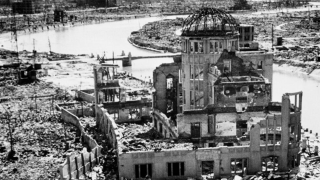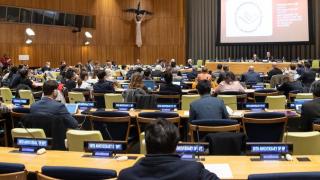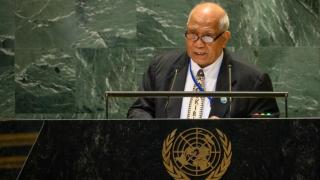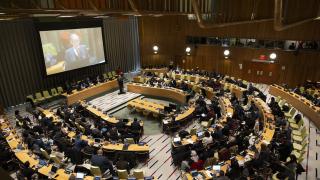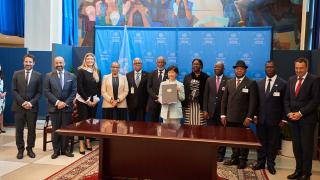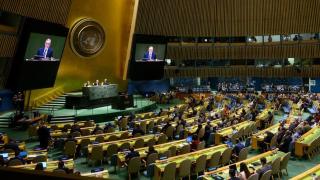
The third Preparatory Committee (PrepCom) for the 2026 Review Conference of the Treaty on the Non-Proliferation of Nuclear Weapons (NPT) has once again concluded without adopting an outcome document.
The 2025 PrepCom meeting, held at the UN Headquarters in New York from 28 April to 9 May, marks the third consecutive PrepCom that has failed to deliver a unified result. This troubling pattern reflects the deep divisions among states parties and a growing loss of faith in the NPT’s capacity to respond to the urgent threats posed by nuclear weapons.
Throughout the two-week session, state representatives debated the full scope of the NPT's pillars: disarmament, non-proliferation, and peaceful use of nuclear technology. The ultimate lack of consensus exposed widening gaps, particularly between nuclear-armed states and the rest of the international community. At the heart of this impasse was the continued reliance on deterrence doctrines and the refusal of nuclear weapon states, including the United Kingdom, to meaningfully advance disarmament. There was further disagreement on ways to strengthen the NPT review process, sharing and transferring of nuclear technologies beyond states in the Treaty and the urgency of implementing disarmament negotiations.
The UK’s Draft Resolution: Upholding the Status Quo
The UK played a visible role during the PrepCom, submitting a draft resolution that sought to reaffirm the centrality of the NPT, highlight its contribution to global security, and emphasise a "step-by-step" approach to disarmament. However, the text largely repeated familiar language and avoided concrete commitments, especially concerning reductions to the UK’s own nuclear arsenal and addressing its recent decision to expand warhead stockpiles.
Rather than offering innovative proposals or addressing mounting concerns about the risks posed by modernisation programmes, the UK’s resolution reiterated long-standing support for nuclear deterrence. This approach, while politically safe among allies, failed to engage with the growing disillusionment among non-nuclear weapon states and fulfil the UK’s obligation to pursue disarmament in good faith. Many viewed the UK’s framing as an attempt to preserve the strategic privileges of the nuclear-armed at the expense of real progress.
Silence on Escalating Nuclear Sharing Rhetoric
One of the more alarming dynamics at this year’s PrepCom was the normalisation of rhetoric around the potential sharing of nuclear weapons in new regions. Against the backdrop of heightened tensions involving nuclear-armed states, suggestions of a “Eurobomb” or expanding nuclear guarantees to additional countries raise the spectre of proliferation under the guise of alliance cohesion.
The UK, along with other nuclear-armed NATO states, declined to explicitly condemn these proposals. Its failure to reaffirm even the core principle of non-proliferation - the backbone of the NPT - drew criticism from civil society and non-nuclear states alike. Campaigners from the International Campaign to Abolish Nuclear Weapons (ICAN) asked pointedly whether the NPT could still be trusted to uphold its own standards.
The TPNW as a Counterpoint…and the UK’s Rejection
In stark contrast to the stagnation of the NPT review process, states aligned with the Treaty on the Prohibition of Nuclear Weapons (TPNW) used the PrepCom to articulate a vision of genuine disarmament. South Africa, Austria, and other TPNW supporters emphasised the treaty’s role in fulfilling the NPT’s Article VI obligation to pursue disarmament in good faith. These states stressed that the TPNW is not a rival to the NPT, but a complementary instrument that raises the normative bar for nuclear disarmament and non-proliferation.
The UK, however, remains firmly opposed to the TPNW, rejecting its legitimacy and accusing it of undermining the NPT. This stance isolates the UK from a growing coalition of states that see the TPNW as the only credible response to the entrenched inertia of the disarmament regime. The humanitarian framing of the TPNW - backed by scientific studies on the catastrophic consequences of any nuclear detonation - resonated strongly during the PrepCom, even as the UK and other nuclear powers sidestepped the issue.
Conclusion: Between Stagnation and Momentum
The failure of the third NPT PrepCom to reach consensus is symptomatic of a deeper crisis within the non-proliferation regime - one marked by growing disillusionment, strategic inertia, and a widening gulf between nuclear and non-nuclear states. The UK’s performance at the PrepCom, from its unambitious draft resolution to its silence on nuclear-sharing rhetoric and continued rejection of the TPNW, underscores a broader unwillingness to confront the realities of today’s nuclear risks. Rather than leading with urgency and moral clarity, the UK has chosen to entrench its reliance on deterrence, reinforcing a status quo increasingly viewed by the international community as illegitimate and dangerous.
As the TPNW gains traction and the humanitarian case for disarmament strengthens, the UK risks further marginalisation unless it rethinks its approach. If the NPT is to remain relevant, it must be revitalised through meaningful action - not empty reaffirmations - and the UK must decide whether to be part of the problem or the solution.
Photo: Opening of the Tenth Review Conference of Parties to Treaty on Non-Proliferation of Nuclear Weapons, 2022. Credit: UN Photo/Loey Felipe
Read more:
- UNA-UK’s UN briefing on the 2025 NPT PrepCom
- An overview of our parliamentary event on nuclear harms
- UNA-UK’s briefing on the 3MSP to the TPNW

